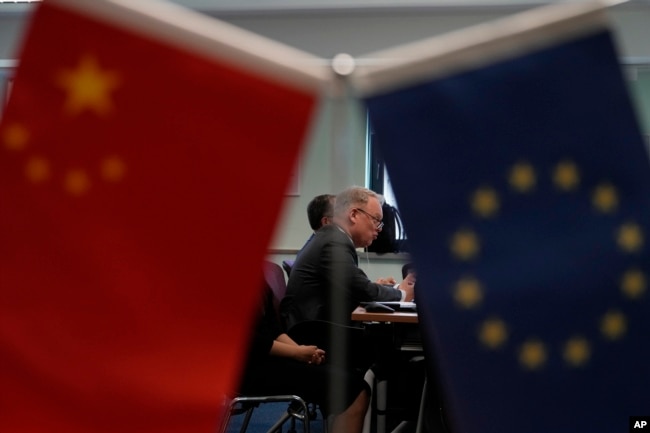A European business group says foreign companies are increasingly pulling investments and operations out of China.
A report by the European Union Chamber of Commerce in China says the changes are linked to government rules for foreign businesses, a slowing economy and rising operating costs.
Foreign companies are also concerned about government protections for Chinese companies and a lack of action on promised reforms.
China’s ruling Communist Party has attempted to increase interest in the world’s second-largest economy since the end of restrictions linked to the COVID-19 pandemic. But many companies are reconsidering their Chinese operations because of new security controls and other business environment policies.
Jens Eskelund is president of the European Chamber. He told reporters the group’s report suggests business confidence in China is “pretty much the lowest we have on record.” Eskelund added there seems to be no expectation “that the regulatory environment is really going to improve over the next five years.”
About 66 percent of the 570 companies that took part in the European Chamber’s research said they felt doing business in China had become more difficult. And three out of five companies said the business environment had become “more political.”

Earlier this year, police raided two advisory companies, Bain & Company and Mintz Group. Chinese officials gave no public explanation for the raids. They only said foreign companies are required to obey the law, without commenting on any possible violations.
Companies also are worried about efforts led by the government of Chinese President Xi Jinping that seem to favor Chinese businesses over foreign competitors. Those efforts have pressed manufacturers, hospitals and others to use Chinese suppliers even if it raises their costs. Foreign companies worry they might be shut out of markets in China.
Last month, the Chinese government placed a restriction on products from the biggest U.S. maker of memory chips, Micron Technology Inc. The products were banned in computers that process sensitive information. Officials said Micron had security issues, but did not provide additional details.
One in 10 companies taking part in the European Chamber report said they had pulled investments out of China. Another one in five said they were delaying or considering moving their investments.
The European Chamber noted that foreign companies were not the only ones making changes. Two out of five businesses taking part in the research reported that Chinese customers or suppliers had also decided to move investments out of China.
A separate group, the British Chamber of Commerce in China, has also expressed concerns about the current business environment in China. It said last month its members were waiting for “greater clarity” about anti-spying, data security and other rules before making new investments.
The European Chamber’s Eskelund said the biggest concern is the ruling party’s wide definition of national security. This currently includes China’s economy, as well as food, energy and politics.
“What does qualify as a state secret? Where does politics begin and the commercial world stop,” Eskelund told The Associated Press. He added that such definitions create unknowns about “where we can operate as normal businesses.”
The European Chamber report said the top place for companies moving their Asian headquarters out of China was Singapore, with 43 percent of companies moving there. The next popular nation was Malaysia. Only 9 percent went or plan to go to Hong Kong.
Top Chinese economic officials have promised to improve operating conditions for foreign companies. But businesses say that, so far, they have seen few clear changes.
I’m Bryan Lynn.
The Associated Press reported this story. Bryan Lynn adapted the report for VOA Learning English.
______________________________________________________________
Words in This Story
confidence – n. the feeling or belief that someone or some group is good or able to succeed at something
regulate – v. to control an activity or process, especially by rules
customer – n. a person or company that buys goods and services
clarity – n. the quality of being clear and easy to understand
qualify – v. to meet a required standard
commercial – adj. related to business or the part of a business or service aimed at making a profit
